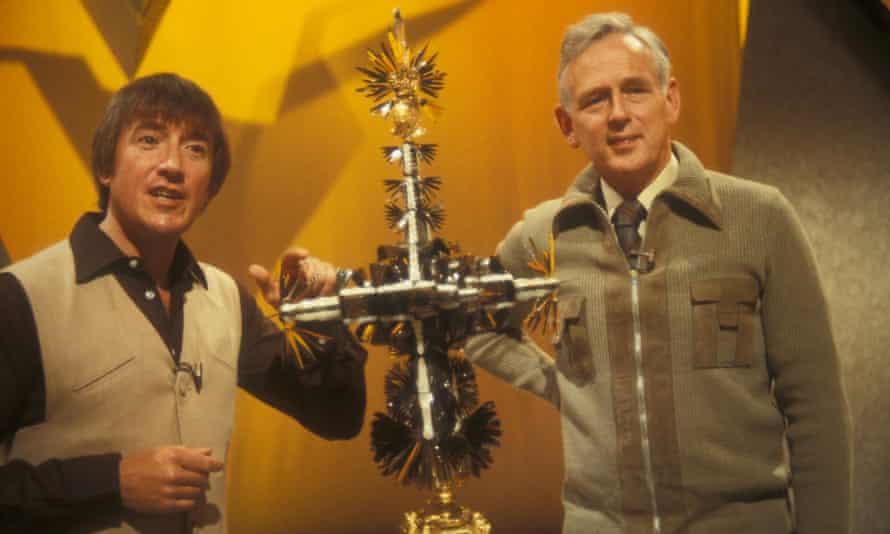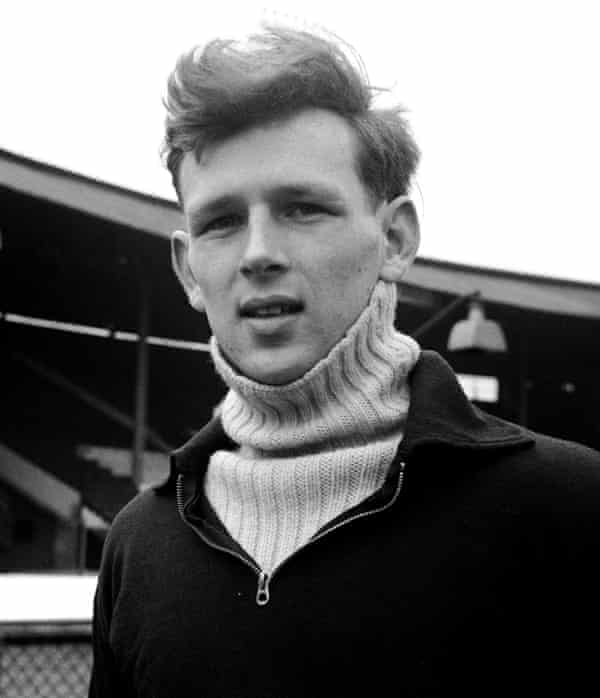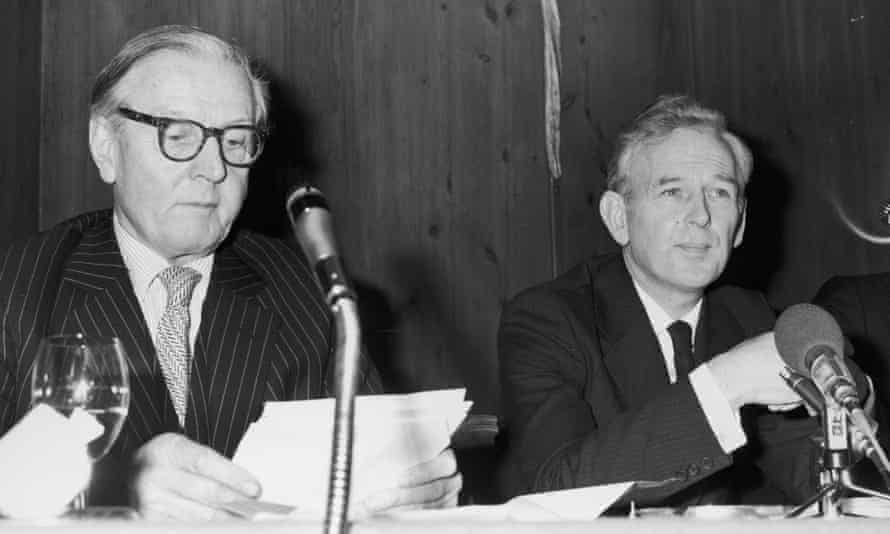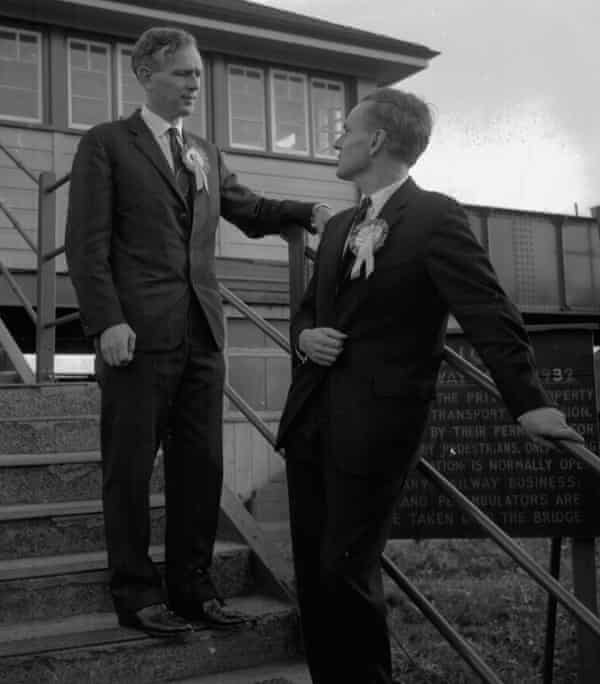Mcwhirter Beef Sheril Mcwhirter
I magine, if you dare, that Katie Hopkins is also the stats guru on Test Match Special. Or that Nigel Farage is renowned not just as the beef-faced broker who got us out of the EU but for his astute postgame analysis on Match of the Day.
Neither of these comparisons really does justice to Norris McWhirter. He was something else. He was alt-right before the term was invented. He was a chum of, and ideological inspiration to, Margaret Thatcher in the 1970s, while at the same time wowing teatime TV viewing kids with his knowledge of outre facts as sidekick to genial trumpet-playing frontman Roy Castle on the BBC's Record Breakers.
If you wanted to be unstoppably hectored by someone in tie and blazer about how the Edward Heath government had committed treason by taking us into the Common Market in 1972 and then find out the the name of the acrobat who performed a quadruple back-somersault on to a chair at the New York Hippodrome in 1915, and the artiste who caught him, Norris McWhirter was your man.
And you can add to that the fact that Norris, along with his twin brother Ross, created the Guinness Book of Records, which had sold more than 75m copies in 37 languages by the time his involvement ended in 1996.

We will never see his like again, not because the world doesn't teem with libertarian ideologues, nor with grown men who know too much about the minutiae of stuff; but because combining these two disciplines successfully in public seems beyond our wit in 2017.
Seven years after his death in 2004, McWhirter briefly returned to public consciousness when comedian David Baddiel did a show for Sky called The Norris McWhirter Chronicles, in which Alistair McGowan played the title role. It was inspired by a day in 1978 at Baddiels' school when the teenage boys turned up for a talk by McWhirter. They were expecting to delight in his knowledge of arcane stats, only to hear him blether for 45 minutes about the Freedom Association, the grassroots rightwing political organisation he co-founded in 1975. We were reminded of this in September when Katie Hopkins announced her intentions to tour the country's schools to talk to teenagers about the importance of owning their opinions.
Baddiel's fascination with McWhirter, though, got him into trouble that same year when the BBC was compelled to apologise for a conversation with Alan Davies on Radio 5 Live. During it, Baddiel described the Freedom Association as a "slightly posher version of the BNP". "Was he a brownshirt with Mosley or whatever they were called?" Davies asked, referring to Oswald Mosley, the 1930s leader of the British Union of Fascists.
The suggestion that McWhirter was a fascist outraged his admirers. Tory MP Julian Lewis argued Baddiel's remarks were "disgraceful", not least because McWhirter was a second world war veteran. Certainly, he fought against, rather than played footsie with fascism, though his later rightwing politics were such as to make anyone to the left of Norman Tebbit seek a cold compress.
After serving on minesweepers in the Pacific in the war, McWhirter went to Trinity College, Oxford where, apart from graduating in international relations and economics, and then taking an MA in law, he became an athlete, running the 100 yards in under 10 seconds. He competed for Great Britain against Norway in 1951, winning the 100 and 200 metres.
His father, William, was managing director of Associated Newspapers and so, perhaps unsurprisingly, Norris and Ross moved into sports journalism, Ross becoming the Star's rugby and tennis correspondent while Norris was for 16 years athletics correspondent of the Observer, and also covered every Olympics from Rome (1960) to Munich (1972) for the BBC.

In 1954, Hugh Beaver, managing director of Guinness, had a bright idea. Roger Bannister had just broken the four-minute mile (McWhirter was the announcer at the Iffley Road, Oxford track that day) and public hunger for records was insatiable. He asked Christopher Chataway, who came second to Bannister, to recommend someone who could write a book about records. In 1955, Norris and Ross published the first Guinness Book of Records, written in a mere 16 weeks. It fast became a bestseller.
The McWhirters were also rightwing political scrappers. In 1958 Norris went to Aldermaston to hector anti-nuclear demonstrators from the roof of his car. "Each one of you is increasing the risk of nuclear war," he shouted through a megaphone. "You are playing Khrushchev's game. Moscow is making use of you." Superbly, he thereby drove lefty pacifists to violence: only after causing £150 damage to his Mercedes were they hauled off by stewards.
Six years later, he stood as Conservative candidate for Orpington, backed by Denis and Margaret Thatcher, losing but cutting the Liberal incumbent's majority, while his brother Ross was defeated as Tory candidate in Edmonton. Their political destiny did not involve elected political office.
On 27 November 1975, Ross was gunned down on the doorstep of his Enfield home. He had offered a £50,000 reward for the capture of what became known as the Balcombe Street Gang, an IRA group responsible for bombings in London. The men who shot him were members of that gang. McWhirter described the loss of his younger twin as "not a bereavement, an amputation".
Five days after the murder, in a blaze of publicity, he appeared at the launch of the National Association for Freedom, along with likeminded souls such as Aims of Industry director Michael Ivens and the group's first chairman, ex-Tory MP and war hero William Philip Sidney. The shady rightwing pressure group Aims of Industry, one of several shady rightwing pressure groups that strove to disrupt the cosy Butskellite consensus in British postwar politics, had been established in 1971 to campaign for business freedom and privatisation, and against the closed shop (the practice where all employees at a workplace must belong to an agreed trade union).
The National Association for Freedom had a similar agenda, fighting union power in a series of struggles that prefigured and inspired Thatcher's destruction of organised labour in the 80s. It still exists, and numbers rightwing Eurosceptic figures such as Roger Helmer and Daniel Hannan among its supporters, although in 1980 the group ditched its unwittingly hilarious acronym Naff and became known as the Freedom Association (TFA).

Today the TFA has around 7,000 members and campaigns against EU membership and for liberalising education and safeguarding the right to privacy. Forty years ago it had a membership of 20,000, most attracted by its libertarian union-busting policies whose historic significance was that it gave Thatcher ideas about how to put Britain in a neoliberal chokehold.
At Naff, McWhirter was involved in a campaign to support parents who sought to retain grammar schools. He was involved, too, in campaigns to undermine trade union power – significantly, financing court action by the managers of the Grunwick photographic laboratory in 1976 to halt mass picketing at the plant by, among others, Arthur Scargill's miners. In 1980 Thatcher acknowledged her ideological debt to McWhirter by awarding him a CBE.
His libertarian, union-bashing agenda being now government policy, he turned his attention to other matters. He gave medals to athletes who boycotted the 1980 Moscow Olympics and defended sportsmen who went to South Africa during apartheid. In 1989 he sought an injunction in the High Court preventing the International Cricket Conference - the game's disciplinary body - from imposing a four-year ban on players visiting the country.
In 1993, he along with Rodney Atkinson – rightwing brother of the actor Rowan – attempted to have then foreign secretary Douglas Hurd prosecuted for treason for signing the Maastricht treaty that created the EU as we know it. "Our main aim was to expose the extent and gravity of the effective removal of the British constitution, the powers of parliament and the democratic sovereignty of the British people," says Atkinson, later co-author with McWhirter of the 1994 book Treason at Maastricht. "We merely pointed out what the British constitution, common law and various statutes (not us!) called treason."

Their case failed, though Atkinson argues that it and the book were instrumental in provoking the groundswell of sentiment in Britain that culminated last year in Britain's referendum vote to leave the EU. "The treason charges set a marker for future conflicts between the voters and the politicians," he argues. "The charges are important today as we seek to ensure a genuine return of democratic sovereignty from the EU, not just to British people but to other nation states."
For McWhirter and Atkinson, the Maastricht treaty was the moment when Britain's ancient rights and liberties were imperilled by faceless Brussels bureaucrats and their no less contemptible political lackeys. "I think we showed how dangerously out of control government was – and is to this day. We see today how unaccountable and unelected forces in the EU or the UN pass down edicts which governments think they have to impose on their unconsulted electorates."
What would McWhirter have made of Brexit Britain? "I think Norris would NOT be surprised how the ideas he promoted are now accepted by a younger generation – nor by the semi-betrayal of those ideas by those in power today," says Atkinson. "Politicians today are only acting in defence of their people because the people forced them to do so!"
I admit that, like the 1970s schoolboys bored by McWhirter's thoughts on Britain's ancient freedoms when all they wanted to hear about was who holds the world record for drinking custard, my attention wandered as Atkinson went on at length about why "accumulated cases of the common law are a greater defence of the people than the "rights" handed down by Power!" (his capital).
I wanted to interrupt: "Yeah, yeah, that's all very well, mister, but tell me, what's the world's biggest fish?" I also wanted the speaker to break from his prepared notes and reply: "The world's largest fish is the whale shark, which can grow to 40ft long and weigh 20 tons. The largest confirmed individual shark is 41.5ft long and weighs 47,000 pounds. She lives off the Great Barrier Reef and is known to surfers as – [pauses for effect] Big Sheila."
But that sort of thing can't happen in 2017. Sadly, there is no one today, not Mr Bean's brother, not Michael Gove, not Jacob Rees-Mogg, not even Richard Osman, with a mind capacious enough to include both out-there libertarian views and a cranial database with more useless but fascinating facts than Google. They don't make them like Norris McWhirter any more.
Source: https://www.theguardian.com/politics/2017/nov/28/norris-mcwhirter-alt-right-guinness-book-records
0 Response to "Mcwhirter Beef Sheril Mcwhirter"
Postar um comentário